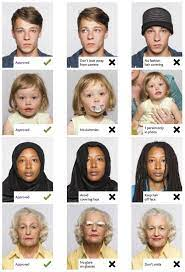what is headshots?
means that the portrait photo is cropped somewhere in the middle torso – so that the focus is on your face.
To take photoshoots for headshots you can either use:
Flash Lighting:
Camera settings (flash lighting)
Tripod: optional
Use transmitter on hotshoe
White balance: daylight (5000K)
ISO: 100
Exposure: Manual 1/125 shutter-speed > f/16 aperture
– check settings before shooting
Focal length: 105mm portrait lens
or, Continuous Lighting:
Camera settings (continuous lighting)
Tripod: recommended to avoid camera shake
Manual exposure mode
White balance: tungsten light (3200K)
ISO: 400-1600 – depending on how many light sources
Exposure: Manual 1/60-1/125 shutter-speed > f/4-f/8 aperture
– check settings before shooting
Focal length: 50mm portrait lens
The deadpan aesthetic
The term “Deadpan” first appeared in print in 1927 in Vanity Fair Magazine, which combined the terms “dead” and “pan,” a colloquial term for a face, to create a noun. It was introduced as an adjective by the New York Times in 1928 to characterise Buster Keaton’s artwork. A deadpan aesthetic is a technically flawless shot with a straightforward, center-focused composition that captures a person, a landscape, or a still life. The background is typically neglected, neutral, and sterile, or it has a single primary topic (a face, a mound of clay, a mining tower, etc.); this does not apply to conceptions that are more sociologically oriented.
Passport Photos
The UK government has a specific list on what passports must include, this can be found on the UK government website.
FACE:
- eyes must be open and clearly visible, with no flash reflections and no ‘red eye’
- facial expression must be neutral (neither frowning nor smiling), with the mouth closed
- photos must show both edges of the face clearly
- photos must show a full front view of face and shoulders, squared to the camera
- the face and shoulder image must be centred in the photo; the subject must not be looking over one shoulder (portrait style), or tilting their head to one side or backwards or forwards
- there must be no hair across the eyes
- hats or head coverings are not permitted except when worn for religious reasons and only if the full facial features are clearly visible
- photos with shadows on the face are unacceptable
- photos must reflect/represent natural skin tone
BACKGROUND:
Photos must have a background which:
- has no shadows
- has uniform lighting, with no shadows or flash reflection on the face and head
- shows a plain, uniform, light grey or cream background (5% to 10% grey is recommended)

